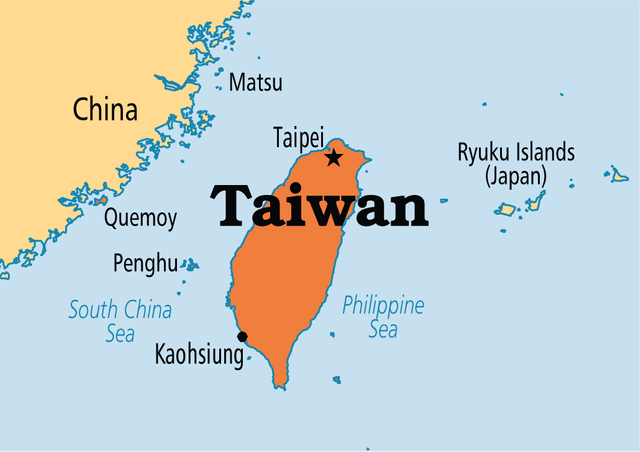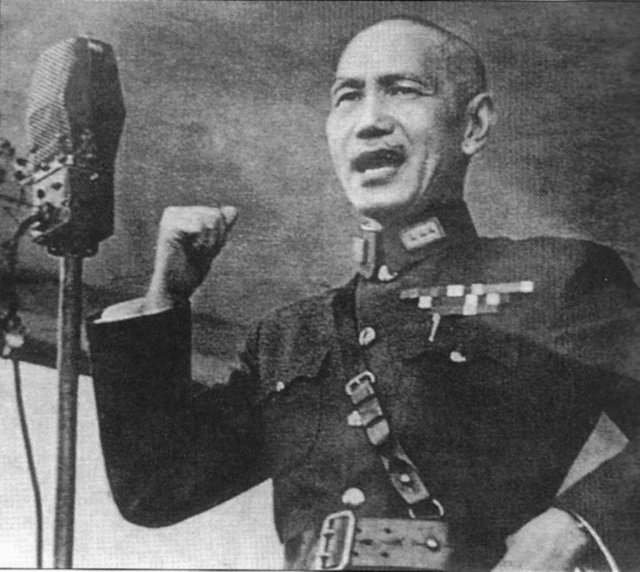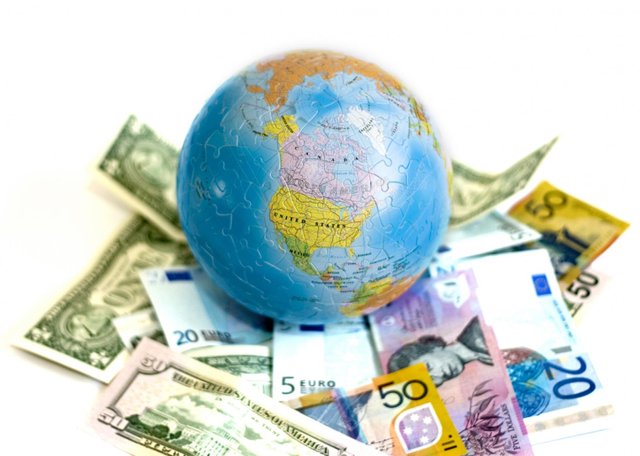How Taiwan Industrialized Post WWII And Proved The Capitalist Model More Successful Than China's Communist Model
How Taiwan Industrialized Post WWII And Proved The Capitalist Model More Successful Than China's Communist Model

One of my areas of study and interest is Asia, mostly because of the rapid industrialization and growth that many countries there have undergone. Taiwan is often forgotten by many westerners, primarily because of its massive neighbor and brother China, but Taiwan is the number 29th country on the GDP per capita list, outranking many western countries such as Canada, France and the UK. Most importantly Taiwan has a higher GDP per capita than China which was and in some ways today still is a stark rival. Comparing China's and Taiwan's different rise to industrialized powers shows how a more capitalistic system vs a communist one was able to, in an extremely short period of time, able to increase the living standards of its people multiple folds. This is how Taiwan industrialized after WWII and why they became the economic power they are today.
Post World War II Recovery
In 1949 after a successful communist movement in mainland China by Mao Ze Dong, Kuomintang leader, former mainland Chinese general and politician Chiang Kai-shek and around one million of his followers fleeing mainland China after being forced out by communist revolutionaries. Taiwan was very unique from the other three little dragons, in the fact that the country itself was never meant to become a permanent residence for Kai-shek and his followers, but rather only a base of operations for plans to retake the mainland. With the goal of retaking the mainland firmly in mind, Kai-shek and other members of the Kuomintang arrived on an island of people who, after 50 years of Japanese colonial rule and a short period of brutal Chinese governorship, had little admiration for outsiders and mainland Chinese. However after a long period of abuse, the native Taiwanese people had become complacent, which allowed the Kuomintang and Chiang Kai-shek to take power in the capital of Taipei quite easily.
Upon arrival, after quickly analyzing the almost non-existent Taiwanese economy the Kuomintang leaders decided to take action to increase prosperity and self sufficiency within the country. Although semi modernized during its time as a colonial power for Japan, a war torn Taiwan, was unable to produce enough for a self-sufficient economy and with little trade from neighboring countries, found it hard to survive. Taiwan, which had primarily exported agricultural products to Japan, soon found a lack of demand for their products after US aid to Japan and a lack of Japanese trading power. In an attempt to move the country towards self sufficiency, the Kuomintang went after a so called “Import Substitution Policy”, which would industrialize Taiwan’s manufacturing industry and boost their agricultural industry so the country no longer needed to rely on trade to survive. After cheap manufactured goods exported from Japan started to threaten Taiwanese industries, specifically textiles, the Kuomintang instituted import restrictions which incentivized local industries to grow and find substitutes which only added to self sufficiency.
By 1951, with a stable government, the success of the import substitution policy and new amounts of foreign aid from the US, Taiwan was looking like a different national than it had been only three years earlier. It was at this point that the Kuomintang set out not to make the same mistakes that they had made in mainland China earlier and made a further push for agricultural development to sustain a lifestyle for the common Taiwanese person. With large amounts of land purchasing from large land owners and redistribution to the lower classes, Taiwan was able to create a booming agricultural industry that was soon able to start creating a surplus and once more start exporting excess goods. The Kuomintang with the help of American aid, were able to greatly increase the post war quality of life for the Taiwanese people after the war and able to rejuvenate the economy through self sufficient planning and incentivization.
Political Stability
When the Kuomintang, under Chiang Kai-shek originally took power over Taiwan, there was little intention to stay long term so instead of catering to the political desires of the native Taiwanese, a more authoritarian approach was taken to government rule. A well organized army and secret police were used in the early days to control the population. Because when the Kuomintang made the move to Taiwan only the closest of Kai-shek’s political associates followed him, he was able to have almost complete control over the party. Many of the officials he butted heads with in the past stayed on the mainland instead of making the move to Taiwan which added to a great amount of party unification under the new Kuomintang.

To Kai-shek, Taiwan served as a second chance of sorts when it came to ruling, as many of the problems that plagued him during his rule of mainland China were able to be directly dealt with from the beginning in Taiwan. The main problem that was addressed early on in the new Kuomintang leadership was corruption and stability it leadership. Political officials were barred from taking place in any private enterprise which aimed to keep the private sector free to grow out of the reach from government officials. The added stability in the government lowered massive inflation that had plagued both China and Taiwan in earlier years and paved way for large sums of private investment into the Taiwanese economy. Without the stability of the Kuomintang in Taiwan, the economy would not have prospered as well as it did.
The Move Towards A More International Taiwanese Economy
In 1959 America, in need of modern allies in the east, made it clear that if Taiwan were to focus on domestic development and commit its resources to industrialization and forget about retaking mainland China, substantial aid would be provided. Although the idea of retaking mainland China was not completely abandoned in the minds of many of the Taiwanese, the Kuomintang leadership agreed to the proposal. In early 1960, the Kuomintang laid out a nineteen point plan for economic and financial reform within Taiwan that heavily incentivized growth of private companies looking to export products.
The key to growing the economy was not in America’s financial aid, but in the aid offered from training many of Taiwan’s future officials at top tier universities in the United States. Chiang Kai-shek was brilliant in the fact that he realized he was out of his league with the economic plans for Taiwan, and enlisted a large amount of foreign trained and specialized technocrats to move Taiwan in the right direction. The strong connections that Taiwan made with the United States, the World Bank and the International Monetary Fund proved substation for providing loans for growth and development during this time.

The newly appointed specialists looked to Japan as an economic model for growth and realized that with relatively few natural resources on the Island, specialization into manufacturing and exporting was the key to growth in Taiwan. Up until that point many of the key manufacturers in Taiwan were state run and simply not as efficient as potential privatized companies. The first challenge was getting the Kuomintang to relinquish government control of these companies and slowly let the country become more privatized. Privatized companies would ensure the best and most talented leaders would run the companies and growth would be sustained. Overall this move proved extremely successful as the amount of exports private companies were doing, as a percentage of exports and as a total amount of exports in general, increased substantially. Although the government kept a few key industries, the majority of manufacturing was now in the hands of the private sector.
With the success of Taiwan’s new economic overhaul, mainland entrepreneurs and outside investors started to flock into the country. Unsatisfied with how the Chinese Communist Party ran business in mainland China, Taiwan was seen as a place where entrepreneurs could go to create private businesses mostly free from government intervention. The number of small businesses in Taiwan during the 60s and 70s increased substantially with a growth of almost three times the number of employees. Large businesses continued to grow as well as the demand for Taiwan made goods skyrocketed globally. In some cases companies would even have to link up with other manufacturers to fulfill foreign demand, which ultimately created useful business connections for the future. Ultimately foreign demand for cheap manufacturing parts and products from countries all around the world, especially America, lead Taiwan into a golden era of prosperity, with a GDP per capita growth of $100 to $7500 in only around four decades. This was a feat that at the time was matched by very few countries in the world and like Japan, Taiwan became an economic model for how to develop a third world country.

The massive success of Taiwan as an economic power in the 20th century was in large part due to the realization of the mistakes that the Kuomintang made in mainland China and the willingness to change them. A stable Taiwanese government and currency also provided faith in the country to outsiders and made foreign investment possible. However, perhaps the most important quality of Taiwan and Kuomintang was the ability to realize that they needed outside expertise which ultimately provided invaluable connections and provided long term growth for the country. In the end it is pretty ironic because although the Kuomintang were originally set to take back the mainland it seems like in the long run they provided more economic well being for East Asia by staying in Taiwan.
It is interesting to consider your article in the light of what happened in Japan after WWII: The American government had "gifted" the Japanese government as a way of repaying the people for the damage cased by the nuclear bombing. the result was in deed, a economic revolution that brought the Japanese people to the top of the world economies... Unfortunately, the results following were the logical effects of such philosophy and their economy is not only struggling, but highly dependent now and, as time goes by, underlines more and more the unsustainability of an economical philosophy based on unlimited resources coming straight from the land. we live in a finite world and we need to take responsibility for it, otherwise, we are running ourselves like a train toward a cliff. Namaste :)
unfortunately the American government wasnt that noble in their pursuits. We predicted that the next war would come with Russia and with a lack of allies in the east, Japan was a launch point for a potential war. This is the reason why we had and still have so many military bases there.
Japans current problem isnt because of dependency, in fact for a long period of time Japan was buying up American companies and buildings like crazy. The problem is many of the manufacturing jobs have gone to other economies and made in Japan doesnt have the praise it used to. With many other countries like South Korea now having cheap automobile industries, Japan got hurt on that front too. Japan was the forerunner in technology but now for many reasons , (lack of innovation, strict society structure, ect) that is no longer the case.
Hum, I guess the quotation marks didn't underline enough the irony of this offer to the Japanese government and its people... Sorry about that. It was almost like a Trojan Horse and a really good test to find out the resulting effect of the doctoral study made, written and offered to them as a way of revitalizing their economy... As it stands right now, the Japanese people, many in villages near the American bases are subjected to "war games" and see themselves loosing land to their military powers and the situation is dire in some cases as I have seen from first hand accounts videos and reports. Namaste :)
We live in a hostile world. Being a peaceful people will not prevent another people from being aggressive towards you. Generally the more peaceful you are the more outside forces will see you as weak. You must always have your military trained and prepared for hostile actions from outside forces.
Take for example the "religion of peace" Islam... You don't have to be hostile towards them in order for them to attack you. You don't have to insult their profit or bomb their homes or have anything to do with them. Simply because you are not one of them, large swaths of their population would have you convert or die.
Remember, If you want peace, prepare for war.
What part of this prosperity do you think is owed to the legally splitting people from working in both government and private industry ? Interesting concept.
Im not sure what percentage but it has definitely helped the economy become much more profitable. State run businesses almost always end up making less than privatized ones, because privatized companies skim the fat and unneeded costs.
Hi @calaber24p, for me communism and socialism are failed ideologies, Here's why I say this , capitalatism is the only Succefull model for any country, i have +17 years living in socialism and i don´t see any good future.
I think specific cases certain ways can work, but in my opinion capitalism might not be perfect but it is a system that does raise quality of life.
@oecp85 You have 58+ years under socialism in that country, am I wrong? And no, there isn't any good foreseeable future for a long time to come yet...
Hi @catsmart, i´m from venezuela not cuba, the socialism was implement here in 1999, that was the begining of our misfortune.
I KNOW you're from Venezuela, AD and copei and convergencia were all socialist parties, all the opposition in Venezuela is socialist. There have not been any "right" wing politicians or parties there. You've been pretty much screwed from 1958 till today, hence 58 years.
Maybe you're right, but we never before had a situation so terrible, this socialism of the 21st century is killing us, I know some people who say they have eaten Dog food in previous governments, but most of them are people without any grade of education or job training who now support this nonsense government because the government gives a bag of food every 15 days. if the situation drive you now to eat dog food you can´t because you don´t find it on stores you must wait for the goverment racion, I really prefer socialism of the last century to this miserable 21st century socialism.
The eating of dog food is just a big lie, dog food has never been cheaper than low quality rice or pasta. Now something like 15% of the population is eating straight out of the garbage. But never forget that previous socialism brought you this one, even if you go back to that socialism (which was pretty bad all in itself), you will have this one back on the government in no time again. See Nicaragua, for example. "Good" socialism will NOT free you from bad socialism EVER. Also that is why I don't see things getting any better there anytime soon, you still don't know what your REAL problem is: socialism in ANY of its variants.
Exactly @calaber24p.
nice one, Taiwan is just a few miles from Philippines and they are really a wealthy country now
East Asia will continue to grab a strong part of the worlds wealth for a time to come. Many people dont know this, but for a long time before China encountered the west, they were much wealthier.
Cool Post
I Am A History Buff!
Interesting post!
Interesting but moving forward, taiwan's economy has been relatively stagnant and also the fact that many countries are ready to be cozy up to China, rather than Taiwan. I am not sure about A stable Taiwanese government.... Haven't you seen the taiwanese politicians fight in the parliament like animals?
Thanks for the post. I am from South Africa and 20 years ago where got a new government which is very pro to socialism and communism. As a matter of fact, they work very close with the South African Communist Party. They started off with a capitalist model but is constantly drag to the socialist side by the communist and the worker unions. Our economy has weakend, and we are standing on the edge to be downgraded to junk status by the Moody's et al. It is good to hear a success story how a country picked itself up. I know that Taiwan still got a battle to fight not to be absorbed by mainland China.